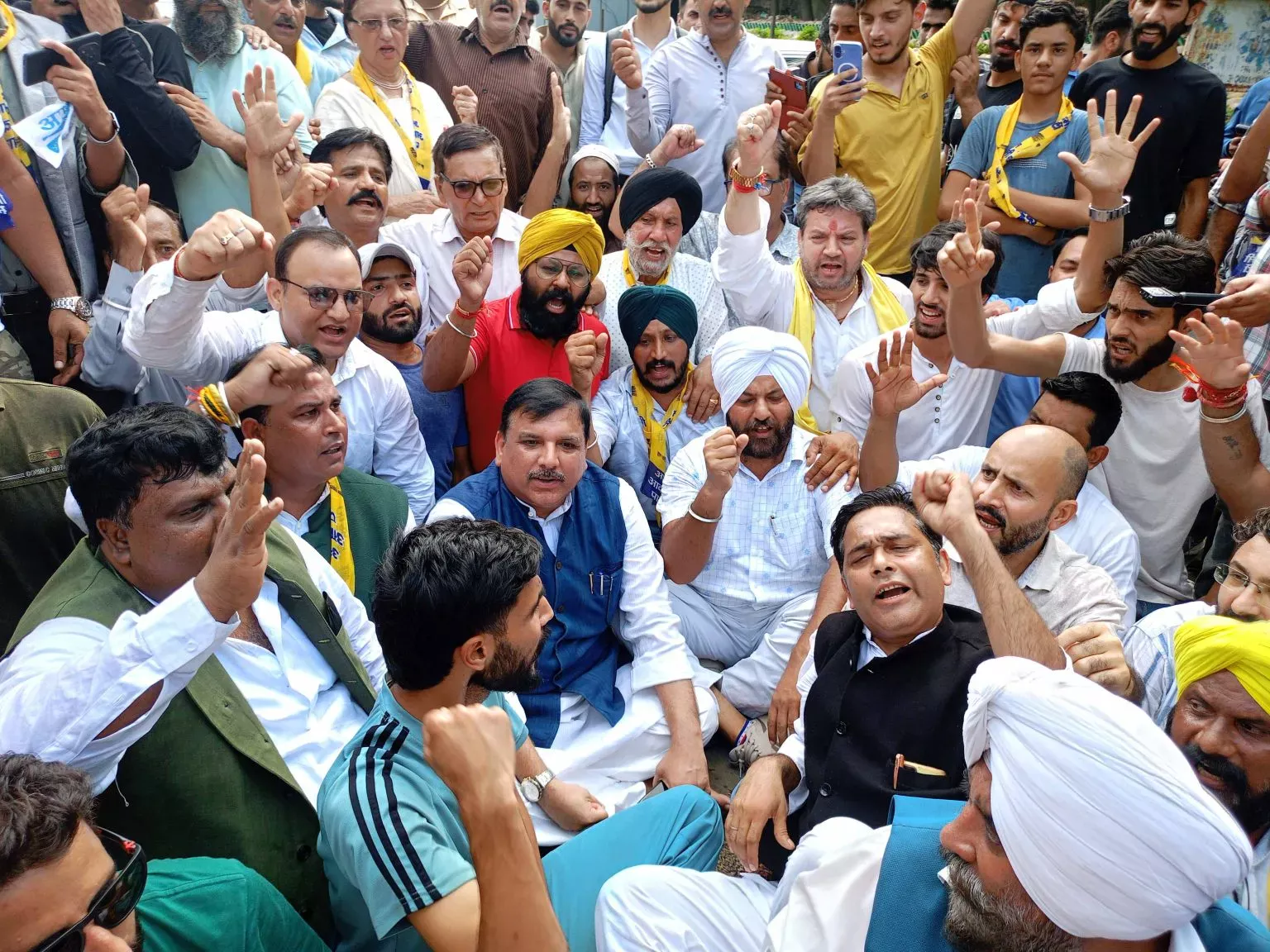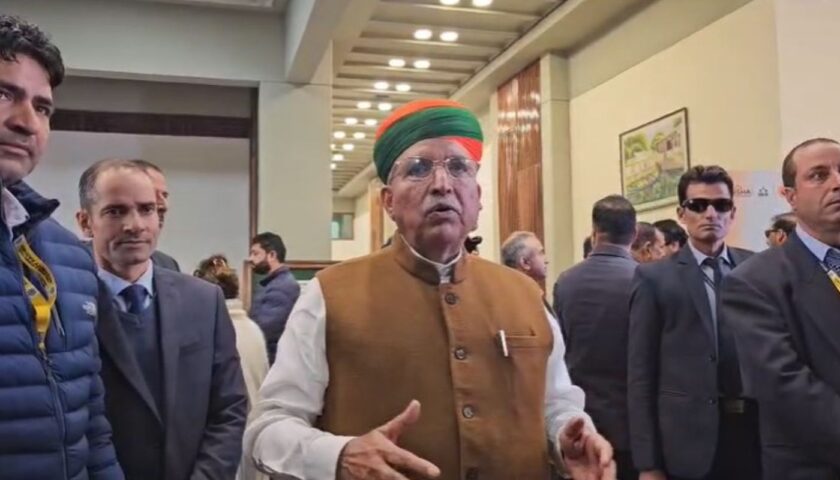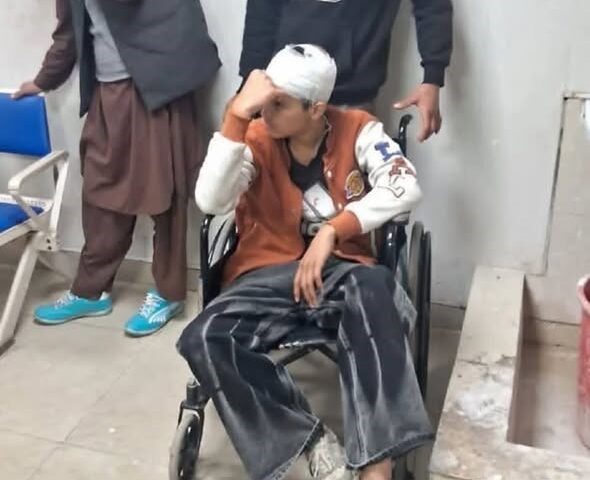Sanjay Singh’s Srinagar Protest: Farooq, Omar, Tarigami Slam PSA Detention of MLA Mehraj Malik
By: Javid Amin | 11 September 2025
A Locked Gate, a Nation Watching
On a tense September morning in Srinagar, an extraordinary scene unfolded: AAP MP Sanjay Singh scaled the iron gate of a government guesthouse, shouting to the crowd outside that he was being held against his will. On the other side stood Dr. Farooq Abdullah, veteran politician and National Conference (NC) president, straining to hear Singh’s voice over the police cordon.
“Milne nahi de rahe, nikalne nahi de rahe,” Singh shouted.
(“They won’t let me meet, they won’t let me leave.”)
The symbolic image—an elected parliamentarian behind bars of authority, and another waiting helplessly outside—has since become a metaphor for the shrinking space of dissent in Jammu and Kashmir.
At the heart of the controversy lies the detention of Mehraj Malik, the lone Aam Aadmi Party MLA from Doda, arrested under the Public Safety Act (PSA). What began as a local protest over healthcare facilities has snowballed into a national debate on civil liberties, constitutional values, and democratic accountability.
Mehraj Malik’s Detention: The Trigger
Who is Mehraj Malik?
-
Elected MLA from Doda representing AAP.
-
Vocal critic of the administration, particularly over healthcare infrastructure gaps in the Chenab Valley.
-
Seen by supporters as a rare voice for grassroots issues.
Why Was He Detained?
On September 8, Malik was booked under the Public Safety Act (PSA), accused of disturbing public order. He was swiftly shifted to Kathua district jail, far from his home constituency.
Critics note:
-
Malik is reportedly the first sitting MLA in J&K to be booked under PSA.
-
The law allows detention without trial for up to two years.
-
The official dossier cited his Facebook lives and social media following as “incitement”—echoing earlier critiques of PSA’s arbitrary use.
Immediate Fallout
-
Protests erupted across Doda and the Chenab Valley.
-
Schools were shut, roads blocked, and internet suspended.
-
The detention quickly escalated from a local administrative issue to a statewide political flashpoint.
Sanjay Singh’s Protest in Srinagar: A Locked Gate and a Loud Voice
When AAP MP Sanjay Singh arrived in Srinagar to protest Malik’s detention, he was placed under house arrest at a government guesthouse.
-
Police locked the gates, preventing Singh from leaving.
-
Visitors—including Farooq Abdullah—were not allowed in.
-
In an act of defiance, Singh climbed the gate to speak with Abdullah.
He later posted on X (Twitter):
“If this is not dictatorship, then what is?”
Symbolism of the Scene
The moment carried heavy symbolism:
-
A parliamentarian literally caged by the state.
-
Another senior leader prevented from meeting him.
-
A gate becoming a metaphor for the barriers between rulers and the ruled.
The visuals went viral, sparking outrage far beyond J&K.
Farooq Abdullah: “This Is Not Autocracy. There Is a Constitution Here.”
Standing outside the gate, Farooq Abdullah condemned both Malik’s detention and Singh’s house arrest.
-
On Mehraj Malik:
“His behavior may have been inappropriate, but it did not warrant preventive detention under PSA.”
-
On Singh’s house arrest:
“This is not autocratic rule. There is a Constitution here. You cannot criminalize peaceful protest.”
Abdullah framed the issue not as partisan politics, but as a test of India’s constitutional values.
Omar Abdullah: “PSA Against MLA Undermines Democracy”
Former Chief Minister Omar Abdullah went further in his critique.
-
On Mehraj Malik:
“There is no justification for detaining him under PSA. He is not a threat to public safety.”
-
On democratic institutions:
“If an unelected administration can detain an elected MLA, how can people have faith in democracy?”
Omar also linked the incident to the Hazratbal emblem controversy, accusing the administration of targeting dissenters while ignoring those responsible for religious hurt.
M.Y. Tarigami: “Slapping PSA on MLA Sets a Dangerous Precedent”
Veteran CPI(M) leader Mohammad Yousuf Tarigami joined the chorus of dissent.
-
He called the PSA a “black law”, historically used to suppress opposition voices.
-
He pointed out that no permission was sought from the Speaker before detaining Malik, raising serious procedural questions.
-
His warning:
“Such actions will only alienate citizens further and erode trust in institutions.”
Tarigami urged political parties across ideologies to unite against draconian laws like PSA and UAPA.
Constitutional Clash: Rule of Law vs Rule by Fear
The episode raises profound constitutional questions:
-
Legality of Detaining an MP
-
Under what law was Sanjay Singh prevented from meeting Farooq Abdullah?
-
Omar Abdullah asked: “On what legal grounds was a Rajya Sabha MP detained?”
-
-
PSA Against an MLA
-
PSA was originally designed for timber smugglers.
-
Its application to an elected MLA undermines legislative privilege and democratic representation.
-
-
Civil Liberties in J&K
-
Internet shutdowns, protest restrictions, and preventive detentions are now routine.
-
Each such act chips away at the faith in constitutional democracy.
-
Broader Implications: Democracy on Trial in J&K
Civil Liberties Shrinking
From journalists to politicians, the use of preventive detention has become normalized. This creates an atmosphere of fear, self-censorship, and alienation.
Political Fallout
-
AAP has seized the issue to highlight BJP’s alleged misuse of institutions.
-
NC and Left leaders see it as proof of authoritarian drift.
-
BJP and administration officials defend the moves as necessary for law and order.
Public Sentiment
On the streets, the episode has become part of a larger narrative:
-
That elected voices are being silenced.
-
That identity and dignity are under siege.
-
That dissent equals detention.
Historical Echoes: From Sheikh Abdullah to Mehraj Malik
J&K’s history is marked by political detentions:
-
1953: Sheikh Abdullah dismissed and jailed.
-
1975–1990s: PSA and other laws frequently used.
-
2019: Mainstream leaders detained post-Article 370 abrogation.
-
2025: Mehraj Malik becomes the first MLA jailed under PSA.
Each detention chips away at the fragile bridge of trust between Kashmir and New Delhi.
Reactions Across India
-
Civil society groups called it a “blatant abuse of power”.
-
Legal experts flagged constitutional violations.
-
Media debates centered on whether J&K is becoming a “democracy without dissent”.
-
Youth voices expressed frustration: “If they can jail our MLA, what chance do we have?”
The Road Ahead: Three Big Questions
-
Will PSA Be Rolled Back or Reformed?
-
Or will it continue to be used as a political weapon?
-
-
Will Opposition Unite?
-
Singh’s protest has created common ground among NC, AAP, CPI(M), and others.
-
-
Will Delhi Respond?
-
Continued clampdowns risk deepening alienation in a region already reeling from loss of autonomy.
-
Bottom-Line: Between the Gate and the Constitution
The image of Sanjay Singh climbing a locked gate to meet Farooq Abdullah will remain etched in political memory—not just as a moment of drama, but as a symbol of the barriers facing democracy in J&K.
At stake is more than Mehraj Malik’s freedom. It is the question of whether India’s democracy can accommodate dissent, uphold constitutional guarantees, and respect the mandate of elected representatives.
For now, the gate may be locked—but the questions it raises remain wide open.




